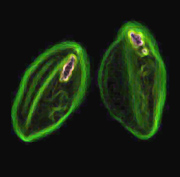Malaria
Malaria is responsible for the deaths of over 1 million people annually, largely affecting children under five years of age and pregnant women. Deaths associated with the disease occur predominantly in sub-Saharan Africa, however, Asia, Latin America and the Middle East are also affected to varying degrees. The causative agent is a parasite belonging to the genus Plasmodium, with the majority of deaths occurring with P. falciparum infection. The parasite develops via asexual replication in the human host and sexual  differentiation in the Anopheles mosquito. Sporozoites, transmitted to the human host via a mosquito bite, infect human liver cells, giving rise to merozoites which invade circulating erythrocytes. The asexual blood stage of their life cycle involves the development from ring stage parasites to trophozoites, which then mature into schizonts containing daughter merozoites. Upon schizont rupture, merozoites are again released into the blood stream, which infect new erythrocytes in a cycle which takes approx 48 hours to complete. A small proportion of the parasites differentiate into the sexual erythrocytic form, gametocytes, which are taken up by the mosquito to undergo sexual development into sporozoites, resulting in the continued transmission of the parasite from one host to another.
differentiation in the Anopheles mosquito. Sporozoites, transmitted to the human host via a mosquito bite, infect human liver cells, giving rise to merozoites which invade circulating erythrocytes. The asexual blood stage of their life cycle involves the development from ring stage parasites to trophozoites, which then mature into schizonts containing daughter merozoites. Upon schizont rupture, merozoites are again released into the blood stream, which infect new erythrocytes in a cycle which takes approx 48 hours to complete. A small proportion of the parasites differentiate into the sexual erythrocytic form, gametocytes, which are taken up by the mosquito to undergo sexual development into sporozoites, resulting in the continued transmission of the parasite from one host to another.
Parasite resistance to anti-malarial drugs has become a major impedance in the treatment of malaria. The chemical diversity of the recognised anti-malarial drugs to date is limited. The concern, with respect to this limited chemical diversity, is that combination therapy of “new” drugs based on the known chemistry backbones will suffer from parasite resistance within a short period of time, due to priming of the parasite by the “existing” drug. Added to this most of the current drugs to date interact with only a small selection of drug targets. There is, therefore, an urgent need for new anti-malarial drugs with chemical and biological diversity, to combat the increasing parasite resistance to current drug treatments.
Asexual High Throughput Screening (HTS)
Discovery Biology have developed and optimised a novel HTS assay using image based analysis for identification of compounds which inhibit parasite proliferation. The development of this assay was instrumental in the collaboration between Discovery Biology (Eskitis), Natural Product Chemistry (Eskitis), Australian Army, QIMR, and Monash University being awarded the 2007 Medicines for Malaria venture (MMV) drug discovery project of the year award.
The assay is capable of screening over 100,000 compounds per screening run and has to date screened over 2 million compounds. Discovery Biology is now recognised by MMV as their “Global Screening Centre”. As part of this collaboration, large corporate chemical libraries from biotech and pharmaceutical companies world-wide are currently being screened.
Parasite Life Cycle Stage Specific Assays
Anti-malarial compounds can have their effect at various stages of the parasite life cycle. This is dependent on the target that the compound is specific for, as the target may only be vital at certain stages of the parasite development. By determining at which stage of the parasite development the compound has the greatest effect, we can start to predict what parasite targets may be the most likely site of action of the compound.
Currently we are investigating the development of an array of stage specific assays for determining compound stage specificity in high through put formats.
Anti–Gametocyte High Throughout Screening Assays.
Gametocytes, the sexual form of the malaria parasite in human, are essential for transmission from one human host to another via a mosquito carrier. Although a number of antimalarial drug therapies are active in vitro against early stage gametocytes, there are few truly effective late stage gametocyte inhibitors.
Gametocyte levels in human and genetic recombination in the mosquito midgut are a major area of research in the development of drug resistance in Plasmodium falciparum. The identification of late stage gametocyte inhibitors or transmission blocking drug therapies are essential for the treatment of malaria.
We have initiated a programme investigating the optimum in vitro growth culturing conditions for late stage gametocyte production. In addition, a number of assay formats are under review for suitability for development into a HTS assay for identification of compounds with late stage anti-gametocyte activities.




